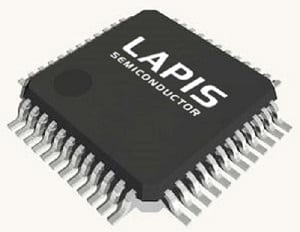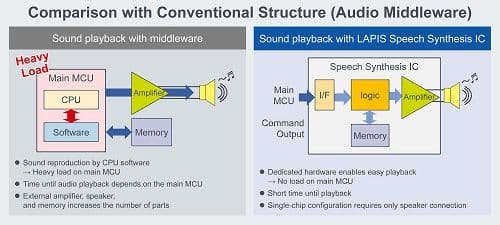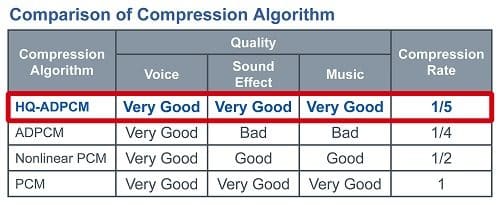- LAPIS Semiconductor, a subsidiary of ROHM aims to provide enhanced sound effects for issuing alerts while driving autonomous vehicles
- This is beneficial for developers of automotive safety systems
 With the increasing presence of ADAS and other safety systems designed to notify drivers of vehicle operation and the surrounding environment, auto manufacturers have now been also prompted to develop audio systems that utilize sound effects and voice to issue warnings and alerts in order to maintain the safety of vehicle occupants and pedestrians.
With the increasing presence of ADAS and other safety systems designed to notify drivers of vehicle operation and the surrounding environment, auto manufacturers have now been also prompted to develop audio systems that utilize sound effects and voice to issue warnings and alerts in order to maintain the safety of vehicle occupants and pedestrians.
Conventional solutions utilize middleware for voice playback that are often comprised of multiple components and place a heavy load on the main MCU, requiring significant man-hours to support countermeasures to avoid risk along with software that responds to system changes.
Now, LAPIS Semiconductor, a ROHM group company has introduced the ML2253x series of automotive speech synthesis ICs that have been optimized for audible notifications and sound effects in Advanced Driver Assistance System (ADAS) and Acoustic Vehicle Alerting System (AVAS). The new product series not only improves quality by detecting audio defects using a playback anomaly function but also facilitates system configuration while simplifying software design for the main MCU. LAPIS Semiconductor speech synthesis ICs incorporate all required amps, communication I/F, logic ICs and memory, enabling configuration of voice prompt systems independently of the main MCU. As a result, they are seeing increased adoption in automotive applications.
The ML2253x series also includes a playback sound anomaly function that can send error signals to the main MCU. This makes it possible to detect playback anomalies such as skipping, thus further improving the quality of automotive audio output systems. Compared with a conventional compression algorithm, HQ-ADPCM enables to achieve high fidelity sound without distortion. Additionally, flash rewrite function from the main MCU enables rewriting of voice data even after shipment.

Key Features
- Playback anomaly detection function: The ML2253x series incorporates a new playback anomaly detection function that re-digitizes the analogue speaker output signal and compares it with the playback data stored in the IC to feedback an error signal to the main MCU when an anomaly above the set value is detected. This makes it possible to improve the quality of the entire system.

- Flash rewrite function from the main MCU: In addition to the standard onboard rewrite function from the ROM writer, a function is integrated for rewriting from the main MCU. This allows data to be rewritten from the main MCU to either internal Flash memory (in the case of the ML22Q53x series) or external Flash memory (ML22530 series) via SPI I/F, making it possible to rewrite voice data not only during development but even after shipment.With this function, it will be possible to support next-generation vehicles equipped with IoT devices that connect to the internet.

- High fidelity and memory savings: The HQ-ADPCM compression method can achieve high fidelity while also saving memory. Conventionally, the uncompressed PCM format is used, since compressed sound effects and music often become distorted. In contrast, the HQ-ADPCM adopted by the ML2253x series utilizes only 1/5th the memory capacity of conventional compression methods while still providing superior playback quality. Converting voice data to HQ-ADPCM is possible using the Speech IC Utility included in the Sound Device Control Kit.

- Integrated multiple functions for automotive ICs: Besides supporting high-temperature operation (105 degrees Celsius) required in automotive applications, LAPIS Semiconductor’s new series is qualified under the international AEC-Q100 reliability standard for automotive components. Many conventional anomaly detection functions are also built-in, including short-circuit, high temperature and command transfer error detection, contributing to improved reliability in automotive voice prompt systems.
Samples are available now with OEM quantities to be available from July 2020 end.
LAPIS Semiconductor also offers the SDCK3 development tool that allows users to create voice data as well as prepare, write, and listen to ROM data stored in LAPIS Semiconductor’s speech synthesis IC. Combining SDCK3 with an optional reference board enables comprehensive evaluation for both hardware and software.








